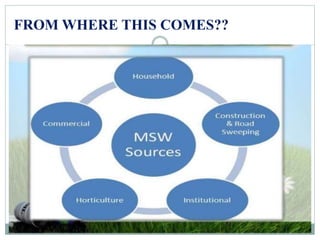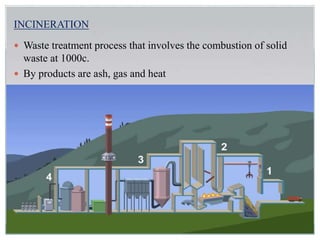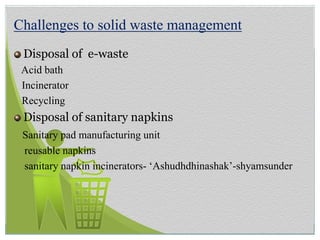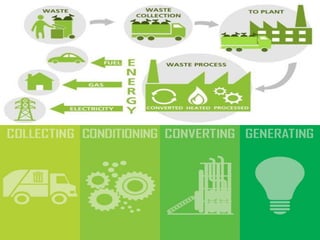Solid waste
- 1. BY, BHANUPRIYA R MY WASTE, MY RESPONSIBILITY SOLID WASTE MANAGEMENT
- 2. In a nutshell, “solid waste can be regarded as refuse or waste from any kind of source”. Solid waste manaement is the collection,transportation and disposal of solid waste in a systematic,economic and hygenic manner.
- 3. FROM WHERE THIS COMES??
- 5. EFFECTS OF WASTE IF NOT PROPERLY MANAGED Affects our health Affects our socio-economic condition Affects our coastal and marine environment Affects our climate
- 6. SOLID WASTE MANAGEMENT Waste management refers to the activities connected with the collection and disposal of waste. Waste management comprises the following activities: waste collection Waste transportation Waste seggregation Waste recycling Waste disposal Waste minimisation and control
- 8. Reduce, Reuse and Recycle Method of waste reduction, waste reuse and recycling are the preferred options when managing waste. Waste reduction and reuse are both methods of waste prevention. They eliminate the production of waste at the source of usual generation and reduce the demands for large scale treatment Donate or exchange Recycling refers to the removal of items from the waste stream to be used as raw materials in the manufacture of new products.
- 9. BENEFITS OF RECYCLING Resource conservation Pollution reduction - crushed glass reduces the energy required to manufacturing of new glass by 50% - Over 60% aluminium cans are recycled. Saves money, resources and land. Encourages individual responsibility.
- 10. WASTE COLLECTION TYPES Curb Alley Set out and set back Backyard collection
- 11. WASTE DISPOSAL/TREATMENT with different types of waste, different treatment methods are applied. These treatment process has been listed below: -open dumps -Landfills -Composting -Inceneration -Pyrolysis
- 12. OPEN DUMPS Low lying uncovered areas. Waste is untreated and seggregated. LANDFILLING 1.Sanitary landfills Placed in areas where land features act as a natural buffer Bottom covered with clay soil or plastic Recover energy – anaerobic decomposition- methane &CO2-LFG system - heat&electricity 2.Bioreactor landfills Used enhanced microbiological process Constant addition of liquid- added recyclating landfill leachate.
- 13. BIOLOGICAL WASTE TREATMENT COMPOSTING It is a process in which organic matter of solid waste is decompossed and converted to humus and mineral compounds . End product is compost – used as fertiliser THERMAL TREATMENT PYROLYSIS Thermal degradation of waste in the absence of air. Decompose organic waste using high temp. Gas ,liquid and chars are the byproduct.
- 14. INCINERATION Waste treatment process that involves the combustion of solid waste at 1000c. By products are ash, gas and heat
- 15. Challenges to solid waste management Disposal of e-waste Acid bath Incinerator Recycling Disposal of sanitary napkins Sanitary pad manufacturing unit reusable napkins sanitary napkin incinerators- ‘Ashudhdhinashak’-shyamsunder
- 17. CONCLUSION As a result of all it was presented, we can conclude that : Composting, pyrolysis and incineration are waste minimization technologies. Thermal waste treatment technologies allow to obtain volume reduction and energy recovery. Composting is a natural process and this makes it an ecological technology for treatment of decomposable wastes.

















